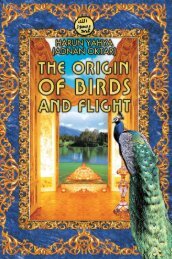Islam, the Qur'an and the Arabic Literature
Islam, the Qur'an and the Arabic Literature
Islam, the Qur'an and the Arabic Literature
Create successful ePaper yourself
Turn your PDF publications into a flip-book with our unique Google optimized e-Paper software.
<strong>the</strong>y considered right <strong>and</strong> wrong, <strong>and</strong> <strong>the</strong> principal basis of reference for most<br />
of <strong>the</strong>ir sciences <strong>and</strong> wisdom. [16]<br />
Almost four centuries earlier, Ibn Faris (d. 1005) elaborated on <strong>the</strong> same<br />
<strong>the</strong>me, but went fur<strong>the</strong>r to comment on <strong>the</strong> quality of <strong>the</strong> poetry that was<br />
composed during <strong>the</strong> pre-<strong>Islam</strong>ic era:<br />
Poetry is <strong>the</strong> archive of <strong>the</strong> Arabs; in it <strong>the</strong>ir genealogies have been<br />
preserved; it sheds light on <strong>the</strong> darkest <strong>and</strong> strangest things found in <strong>the</strong> Book<br />
of God <strong>and</strong> in <strong>the</strong> tradition of God’s apostle <strong>and</strong> that of his companions.<br />
Perhaps a poem may be luckier than ano<strong>the</strong>r, <strong>and</strong> one poem sweeter <strong>and</strong><br />
more elegant than ano<strong>the</strong>r, but none of <strong>the</strong> ancient poems lacks its degree of<br />
excellence. [17]<br />
Such was <strong>the</strong> role that <strong>the</strong> spoken word played in <strong>the</strong> life of pre-<strong>Islam</strong>ic Arabs.<br />
With <strong>the</strong> emphasis placed on eloquent <strong>and</strong> articulate speech, <strong>the</strong> prominent<br />
position occupied by those who had <strong>the</strong> talent for linguistic composition, <strong>and</strong><br />
<strong>the</strong> pride <strong>the</strong> early Arabs took in <strong>the</strong>ir language, it is little wonder that <strong>the</strong><br />
Qur’an was revealed in <strong>the</strong> most eloquent, articulate, <strong>and</strong> elaborate style <strong>the</strong><br />
<strong>Arabic</strong> language has known. The Qur’an has without doubt provided a level of<br />
linguistic excellence unparalleled in <strong>the</strong> history of <strong>the</strong> <strong>Arabic</strong> language.<br />
Theologians explain this phenomenon as God’s wisdom in addressing <strong>the</strong><br />
articulate Arabs through <strong>the</strong> medium in which <strong>the</strong>y were most adept <strong>and</strong> with<br />
which <strong>the</strong>y felt most comfortable. The effectiveness of <strong>the</strong> Qur’an was thus<br />
ensured by <strong>the</strong> fact that it represented a level of eloquence unattainable even<br />
by <strong>the</strong>ir most eloquent speakers. The Qur’an remains a book of inimitable<br />
quality, not only from a linguistic, but also from <strong>and</strong> intellectual, point of view.<br />
When Muhammad was challenged by his fellow countrymen to present a<br />
miracle, in keeping with <strong>the</strong> tradition of o<strong>the</strong>r prophets, he presented <strong>the</strong><br />
Qur’an to <strong>the</strong>m. The inimitability of <strong>the</strong> Qur’an is repeatedly emphasized in <strong>the</strong><br />
Holy Book itself. Thus <strong>the</strong> Qur’an challenges <strong>the</strong> disbelievers:<br />
And if you are in doubt as to what we have revealed, <strong>the</strong>n produce a sura like<br />
unto it. (2: 23) [18]<br />
A yet stronger challenge occurs in ano<strong>the</strong>r chapter:<br />
Or do <strong>the</strong>y say: ’He forged it’? Say: ’Bring <strong>the</strong>n a sura like unto it <strong>and</strong> call [to<br />
your aid] anyone you can. ’ (10: 38)<br />
The role of <strong>the</strong> poet in pre-<strong>Islam</strong>ic Arabia<br />
Except for a few proverbs, legends, <strong>and</strong> some magical <strong>and</strong> medicinal<br />
formulee, <strong>the</strong> bulk of <strong>the</strong> literary heritage from <strong>the</strong> pre-<strong>Islam</strong>ic era was in <strong>the</strong><br />
form of poetry. [19] Prose, which lacks <strong>the</strong> elaborate rhythm <strong>and</strong> formal<br />
structure of poetry, did not lend itself easily to memorization. Fur<strong>the</strong>rmore, in<br />
<strong>the</strong> absence of a developed system of writing, prose was much less easily<br />
preserved. Prose works from <strong>the</strong> pre-<strong>Islam</strong>ic period were mainly genealogies<br />
(ansab) <strong>and</strong> legends dealing with inter-tribal wars (ayyam al-’arab). [20]<br />
4




